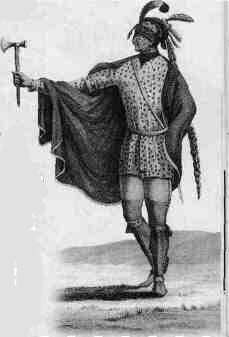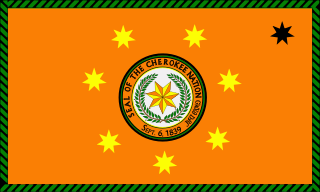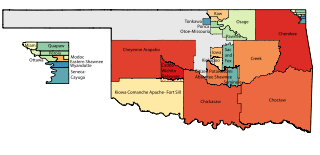
This is a list of federally recognized Native American Tribes in the U.S. state of Oklahoma. With its 38 federally recognized tribes, [1] Oklahoma has the third largest numbers of tribes of any state, behind Alaska and California.

This is a list of federally recognized Native American Tribes in the U.S. state of Oklahoma. With its 38 federally recognized tribes, [1] Oklahoma has the third largest numbers of tribes of any state, behind Alaska and California.

Indian Territory and the Indian Territories are terms that generally described an evolving land area set aside by the United States government for the relocation of Native Americans who held original Indian title to their land as an independent nation-state. The concept of an Indian territory was an outcome of the U.S. federal government's 18th- and 19th-century policy of Indian removal. After the American Civil War (1861–1865), the policy of the U.S. government was one of assimilation.

Ottawa County is a county located in the northeastern corner of the U.S. state of Oklahoma. As of the 2020 census, the population was 30,285. Its county seat is Miami. The county was named for the Ottawa Tribe of Oklahoma. It is also the location of the federally recognized Modoc Nation and the Quapaw Nation, which is based in Quapaw.

The Illinois Confederation, also referred to as the Illiniwek or Illini, were made up of 12 to 13 tribes who lived in the Mississippi River Valley. Eventually member tribes occupied an area reaching from Lake Michicigao (Michigan) to Iowa, Illinois, Missouri, and Arkansas. The five main tribes were the Cahokia, Kaskaskia, Michigamea, Peoria, and Tamaroa. The spelling Illinois was derived from the transliteration by French explorers of iliniwe to the orthography of their own language. The tribes are estimated to have had tens of thousands of members, before the advancement of European contact in the 17th century that inhibited their growth and resulted in a marked decline in population.

Tribal sovereignty in the United States is the concept of the inherent authority of Indigenous tribes to govern themselves within the borders of the United States.

The Sac and Fox Nation is the largest of three federally recognized tribes of Sauk and Meskwaki (Fox) Indian peoples. Originally from the Lake Huron and Lake Michigan area, they were forcibly relocated to Oklahoma in the 1870s and are predominantly Sauk. The Sac and Fox Oklahoma Tribal Statistical Area (OTSA) is the land base in Oklahoma governed by the tribe.

The Peoria are a Native American people. They are enrolled in the federally recognized Peoria Tribe of Indians of Oklahoma headquartered in Miami, Oklahoma.

An American Indian reservation is an area of land held and governed by a U.S. federal government-recognized Native American tribal nation, whose government is autonomous, subject to regulations passed by the United States Congress and administered by the United States Bureau of Indian Affairs, and not to the U.S. state government in which it is located. Some of the country's 574 federally recognized tribes govern more than one of the 326 Indian reservations in the United States, while some share reservations, and others have no reservation at all. Historical piecemeal land allocations under the Dawes Act facilitated sales to non–Native Americans, resulting in some reservations becoming severely fragmented, with pieces of tribal and privately held land being treated as separate enclaves. This jumble of private and public real estate creates significant administrative, political, and legal difficulties.

The Cherokee Nation, formerly known as the Cherokee Nation of Oklahoma, is the largest of three federally recognized tribes of Cherokees in the United States. It includes people descended from members of the Old Cherokee Nation who relocated, due to increasing pressure, from the Southeast to Indian Territory and Cherokees who were forced to relocate on the Trail of Tears. The tribe also includes descendants of Cherokee Freedmen, Absentee Shawnee, and Natchez Nation. As of 2023, over 450,000 people were enrolled in the Cherokee Nation.

The Little Traverse Bay Bands of Odawa Indians is a federally recognized Native American tribe of Odawa. A large percentage of the more than 4000 tribal members continue to reside within the tribe's traditional homelands on the northwestern shores of the state of Michigan's Lower Peninsula. The historically delineated reservation area, located at 45°21′12″N84°58′41″W, encompasses approximately 336 square miles (870 km2) of land in Charlevoix and Emmet counties. The largest communities within the reservation boundaries are Harbor Springs, where the tribal offices are located; Petoskey, where the Tribe operates the Odawa Casino Resort; and Charlevoix.
Indian termination is a phrase describing United States policies relating to Native Americans from the mid-1940s to the mid-1960s. It was shaped by a series of laws and practices with the intent of assimilating Native Americans into mainstream American society. Cultural assimilation of Native Americans was not new; the belief that indigenous people should abandon their traditional lives and become what the government considers "civilized" had been the basis of policy for centuries. What was new, however, was the sense of urgency that, with or without consent, tribes must be terminated and begin to live "as Americans." To that end, Congress set about ending the special relationship between tribes and the federal government.

Several Native American tribes within the United States register motor vehicles and issue license plates to those vehicles.

The Winnebago Reservation of the Winnebago Tribe of Nebraska is located in the U.S. in Thurston County, Nebraska, United States. The tribal council offices are located in the town of Winnebago. The villages of Emerson, south of First Street, as well as Thurston, are also located on the reservation. The reservation occupies northern Thurston County, Nebraska, as well as southeastern Dixon County and Woodbury County, Iowa, and a small plot of off-reservation land of southern Craig Township in Burt County, Nebraska. The other federally recognized Winnebago tribe is the Ho-Chunk Nation of Wisconsin.
The Supreme Court decision in Obergefell v. Hodges that legalized same-sex marriage in the states and most territories did not legalize same-sex marriage on Indian reservations. In the United States, Congress has legal authority over tribal reservations. Thus, unless Congress passes a law regarding same-sex marriage that is applicable to tribal governments, federally recognized American Indian tribes have the legal right to form their own marriage laws. As such, the individual laws of the various United States federally recognized Native American tribes may set limits on same-sex marriage under their jurisdictions. At least ten reservations specifically prohibit same-sex marriage and do not recognize same-sex marriages performed in other jurisdictions; these reservations remain the only parts of the United States to enforce explicit bans on same-sex couples marrying.

Oklahoma Tribal Statistical Area is a statistical entity identified and delineated by federally recognized American Indian tribes in Oklahoma as part of the U.S. Census Bureau's 2010 Census and ongoing American Community Survey. Many of these areas are also designated Tribal Jurisdictional Areas, areas within which tribes will provide government services and assert other forms of government authority. They differ from standard reservations, such as the Osage Nation of Oklahoma, in that allotment was broken up and as a consequence their residents are a mix of native and non-native people, with only tribal members subject to the tribal government. At least five of these areas, those of the so-called five civilized tribes of Cherokee, Choctaw, Chickasaw, Creek and Seminole, which cover 43% of the area of the state, are recognized as reservations by federal treaty, and thus not subject to state law or jurisdiction for tribal members.

Both the Oklahoma and Indian Territories contained suzerain Indian nations that had legally established boundaries. The US federal government allotted collective tribal landholdings through the allotment process before the establishment of Oklahoma as a state in 1907. Tribal jurisdictional areas replaced the tribal governments, with the exception of the Osage Nation. As confirmed by the Osage Nation Reaffirmation Act of 2004, the Osage Nation retains mineral rights to their reservation, the so-called "Underground Reservation".
Sharp v. Murphy, 591 U.S. ___ (2020), was a Supreme Court of the United States case of whether Congress disestablished the Muscogee (Creek) Nation reservation. After holding the case from the 2018 term, the case was decided on July 9, 2020, in a per curiam decision following McGirt v. Oklahoma that, for the purposes of the Major Crimes Act, the reservations were never disestablished and remain Native American country.
McGirt v. Oklahoma, 591 U.S. ___ (2020), was a landmark United States Supreme Court case which held that the domain reserved for the Muscogee Nation by Congress in the 19th century has never been disestablished and constitutes Indian country for the purposes of the Major Crimes Act, meaning that the State of Oklahoma has no right to prosecute American Indians for crimes allegedly committed therein. The Oklahoma Court of Criminal Appeals applied the McGirt rationale to rule nine other Indigenous nations had not been disestablished. As a result, almost the entirety of the eastern half of what is now the State of Oklahoma remains Indian country, meaning that criminal prosecutions of Native Americans for offenses therein falls outside the jurisdiction of Oklahoma’s court system. In these cases, jurisdiction properly vests within the Indigenous judicial systems and the federal district courts under the Major Crimes Act.